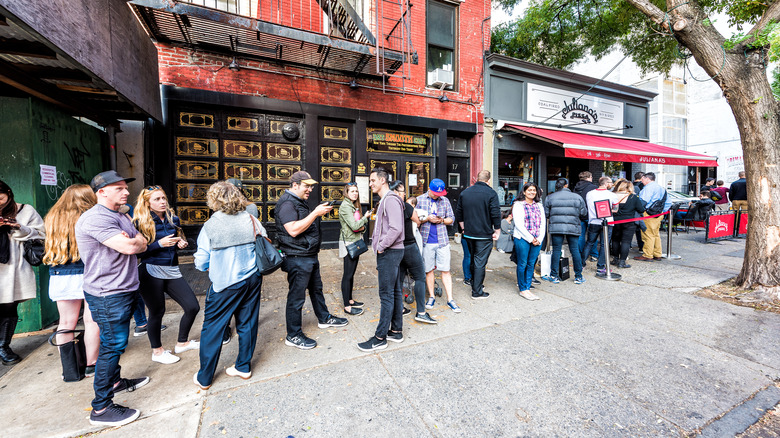The Reason Some Restaurants Don't Take Reservations Despite Being Busy
Taking reservations has long been the norm among restaurants. It ensures that keen diners have a table when they arrive, while helping restaurants better manage the dining room. There's a reason why even Anthony Bourdain made reservations when dining out! And yet, a curious trend is emerging: More and more restaurants have stopped taking reservations altogether.
Whether it's the best pizza joints in the U.S. or popular American steakhouses, many restaurants are ditching the reservation book. The exact reasons may vary from one establishment to the next, but in the end, it boils down to this: It's not worth it for them. For starters, diners don't always show up for their reservations. According to OpenTable, close to 30% of Americans admitted to skipping out on their reservations in 2020 and 2021. It's also not uncommon for diners to arrive late.
If it's a busy restaurant, that translates to a long queue of customers at the front and vacant but reserved tables inside waiting for tardy diners. And when groups of diners don't arrive together, it extends the dining time. So, some restaurants use a no reservation policy to turn tables faster. This also saves them from having to allocate staff to take phone calls and manage reservations, too. They don't stop taking bookings despite being busy; they stop because they're busy.
Some restaurants are applying a cancellation fee
To make things easier for diners without putting themselves at a disadvantage, some restaurants now employ a no-show fee to encourage diners to stick to their bookings. And no, it's not just a minor administrative fee — it's sometimes hefty enough to cover an entire meal. When booking at the U.K. restaurant Mýse, for example, you'll be charged 50 pounds (about $63) per head as a deposit for dinner.
If you're reserving a room, the deposit jumps to a whopping 125 pounds (about $159) per head. If you show up as planned, then this deposit will go toward the final bill. But if you pull a last-minute cancellation (actually, within three days before the booked date!), kiss that deposit goodbye. While the high fee will likely put some off, it also encourages diners to commit to their plans and prevents loss of revenue for the restaurant if they don't.
Of course, plenty of restaurants still take reservations without charging a cancellation fee, though we can never be sure if or when they might jump on either of the bandwagons if diners keep ditching their bookings at this rate. In the meantime, we might need to start embracing the spontaneity of just walking into restaurants and discovering what they have to offer.

